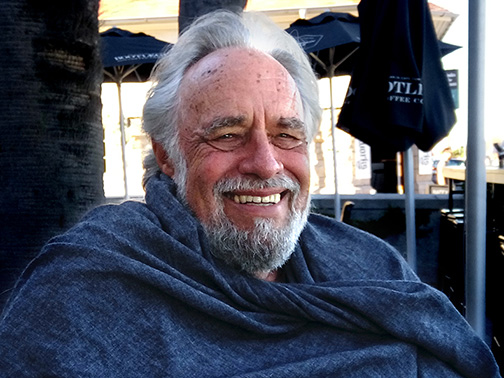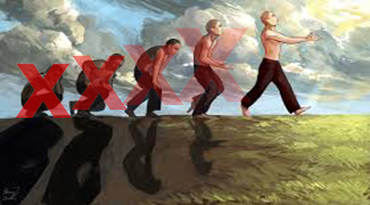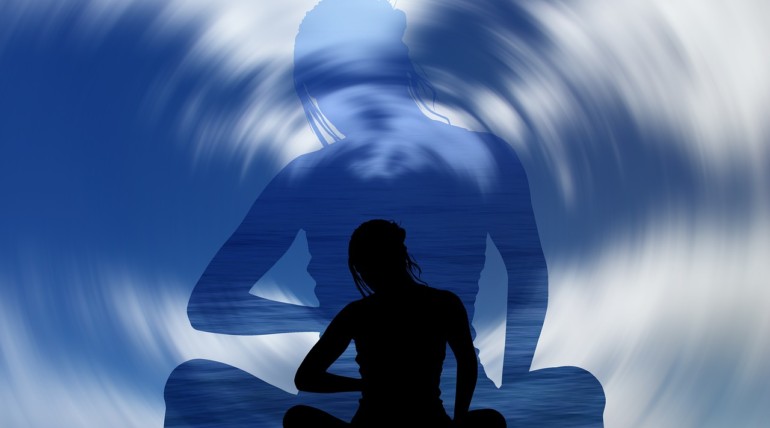Is Enlightenment Possible for Serious Yogis?
(Taken from an interview for Yoga and Health Magazine)
James: It depends on what you mean by ‘serious.’ Although Yoga has become a mass phenomenon but in general people in the West do not take to yoga for enlightenment. At the lowest level yoga is just a sophisticated calisthenics’ regimen. But Yoga can be much more than a good workout. In India it is a healthy spiritual way of life. You live according to certain tried and true spiritual principles. It is an amazing system that basically takes the stress out of life. In the West most people who practice yoga do so because their lifestyles are unhealthy. They just work out the stress physically and feel good for a while and then go back to the bad habits that caused the stress in the first place. So it is a coping strategy. But there is a psychological and spiritual dimension to Yoga too. It is about getting free of your psychological hang-ups. There is a famous scripture called the Patanjali Yoga Sutras that lays out the whole discipline. Freedom or enlightenment is seen in the Yoga system as a permanent state of happiness in which you see everything equally. It is called Samadhi. Sama means equal and ‘dhi’ is a contracted from of ‘buddhi’ or intellect. So it indicates a person who has the vision of oneness.
Interviewer: Can you explain what Vedanta is?
James: Vedanta is usually called the yoga of knowledge or the yoga of no-contact. There is a certain irony in this statement because yoga means contact, union, communication, connection. The idea in Yoga is that you ‘connect’ with and become one with your self. And since your self is the self in everyone and everything, you experience oneness with everything. In this way you become free of inner and outer conflict. Knowledge Yoga frees the self from dependence on objects. It is not an intellectual teaching, although it requires a discriminating mind. It engages the seeker in such a way that it produces insight into the nature of reality in most individuals.
Interviewer: What do you mean by objects?
James: An object is anything that you depend on for happiness other than your own self. The problem with depending on objects like people, for example, is that they constantly change. And even if the object remains the same, the desires of the subject, the one who is relying on the object for happiness, constantly changes. So happiness, which is the result of the successful pursuit of and enjoyment of an object, never lasts.
Interviewer: This sounds very challenging. How does it work?
James: You have to look into yourself to see if you, the subject, is lacking in happiness. You need to determine if the happiness comes from the object or if it comes from you. The method is enquiry. If you look at the reality of your own experience in light of the teachings of Vedanta you will see that that the way you see things is not the way things really are. You realize that you are ignorant of the nature of the Self. If you have a proper Vedanta teacher, he or she can help you understand the true nature of reality.
Most of us feel small, insecure, incomplete and inadequate. This feeling drives our desire for objects, like security, pleasure, power, status, or relationships. When we want or don’t want something the mind is disturbed by the desire and we don’t see things clearly. We project what we really want on the object and then we are disappointed when it fails us.
Interviewer: Patanjali talks about this inability to see things as they really are in the Yoga Sutras. So why would Vedanta offer a more effective way of freedom?
James: Because Patanjali’s methods depends on achieving certain states of mind. Patanjali’s notion of freedom is experiential. That is, there is something that you have to ‘do’ to set yourself free. This doesn’t work because freedom, kaivalya, which is a word for lasting unconditional happiness, cannot be the result of any action. The doer of any action is limited and the results of action are limited, but freedom is limitless, so it cannot be caused by something a person does. Freedom is the nature of the true Self. It is something that we are, not something to be gained. A long time ago the Vedic sages evolved a method of inquiry that shows us how to get what we already have. It is quite simple, but extraordinary at the same time.
Interviewer: What do you mean by the Self?
James: The Self is your own consciousness, your awareness. It is always free of objects. Often in spiritual literature you see it capitalized to distinguish it from the ego but this can cause a person to think that there are two selves, a higher one and a lower one, a true one and a false one. But there is only one self and it is non-dual, ordinary, actionless whole and complete awareness. It is very simple and very immediate and at the same time very difficult to realize because of the deeply conditioned belief that you are the sum total of all the experiences that happened to you.
Interviewer: OK, so I am aware that some of the scriptures such as the Bhagavad Gita and the Upanishads talk about the Self or Awareness. But is it really possible for any of us to reach this state?
James: Yes, but the Self is not a state. We are already the Self.
Interviewer: So how do we know when we have realised this?
James: Because your desire for objects dries up. You no longer feel that you need anything to be happy. You are Self-satisfied.
Interviewer: Can you describe what this feels like?
James: It is a sense of wholeness and completeness, authenticity. You feel like a rock, nothing can disturb you. It is more than object happiness. It is contentment. It is a sense of uncaused well being, a feeling that is not a feeling that you are love. It is peace, the peace that passes understanding.
Interviewer: Is this something that many people can know?
James: If they are eligible. If their minds are prepared, then yes. This is where Patanjali is very valuable because different kinds of yoga can prepare the mind so that it can grasp the understanding that there is only one Self and that it is ever-free awareness.
Interviewer: So what kinds of preparation are you talking about other than Patanjali?
James: Karma yoga. This means giving up anxiety that you feel for the fruits of your action because you understand that they are not in your hands. You may be a doer of action but you are not the ordainer of the result.
Interviewer: So who is?
James: God is.
Interviewer: What do you mean by God? In my own yoga study there is a lot of confusion around this word. Do you mean Isvara as described in the Yoga Sutras?
James: Yes. God is the whole field of existence…the creation…in which the doers or jivas (individuals) are working for results. Most of us see ourselves as the doers. God is purusha, or Awareness operating prakriti, the field of existence. So yes, you can also use the term Isvara of God, but these are just words that refer to life. Life gives you what it wants you to have, not necessarily what you want.
So you do what you do as a worship of God, the field of life, with love and you accept what life has to offer. This quickly purifies the mind. It clears up emotional problems, most of which come from an unrealistic view of what life can and cannot do for you.
Interviewer: Are there any other preparations that you would recommend for self-realisation or is karma yoga enough?
James: Tri-guna vibahva yoga is highly effective. This means creating a pure mind by manipulating the gunas. The idea is to have a sattvic lifestyle which leads to a sattvic mind. Most yoga teachers understand the importance diet and lifestyle but I am not sure how many understand the value of a purely sattvic mind. Yoga people tend to be rajasic and sattvic, with perhaps a bit too much rajas. Rajas is good for getting out of tamas, but it is a problem when it comes to self inquiry because the mind needs to be very quiet for inquiry. Karma yoga and the yoga of the three gunas are indirect means of self realization.
Meditation is very useful too but it is a more advanced method because your life needs to be reasonably settled for it work. Many yoga people find meditation difficult owing to excessive rajas and a lack of the karma yoga attitude. Meditation is also an indirect means.
And the direct means of self realization is jnana yoga or self inquiry because ultimately the problem of self realization is a problem of self ignorance and only knowledge, not techniques, remove ignorance. Jnana yoga supplies the seeker with cognitive tools which change the way you see yourself and the world. And then by contemplating the meaning of the teachings, it brings about direct insight into your nature as ever-free awareness.
Interviewer: I know in Vedanta and also in your book How to Attain Enlightenment you talk about reality being non-dual. Can you explain this?
James: It seems like I am here and you are there. The world physically appears as outside the body. So it is natural to think that reality is the way it seems to be. But it is not really like that. What appears to be separate – subject and object – is actually the same substance. In terms of the language of yoga, purusha, your awareness, and prakriti, your body, are actually one and the same. So to break down this sense of duality, you have to use the teachings of Vedanta to get it clear. It can be very easy because everyone actually does know at some deeper level that they are non-separate from everything, but it can also be very difficult to realize because of our conditioning to the contrary.
In much of the spiritual literature relating to yoga it is said that purusha, the Self, has ‘become’ prakriti. This causes a big problem because how do you reverse the process and turn prakriti into purusha? You don’t because purusha and prakriti are one and the same…non-dual awareness. But they seem to be different owing to ignorance. So you only have to get rid of the ignorance. It is easier said than done. When you have a dualistic orientation to life, suffering is inevitable.
Interviewer: Many will find these concepts difficult.
James: Indeed. You need to investigate and you need a qualified teacher to investigate properly and remove ignorance. This is where Vedanta comes in. The purpose of Vedanta is happiness. Happiness, as I said, is freedom from the dependence on objects. But we can’t appreciate this until the mind is clear. Patanjali makes the point in Chapter Four that the goal of yoga is kaivalya, or freedom.
Interviewer: Are you seeing more interest in Vedanta?
James: There is more interest than ever before. I don’t think it is a co-incidence that the thirst for spirituality has grown since the post-war prosperity. The more materialistic society is, the more suffering there is. People are prone to distractions: entertainment, drink, drugs and other obsessions and compulsions that they believe will relieve the suffering but they are misinformed. The worldly solutions are part of the problem, not the solution.
Interviewer: Is what is called the non-dual or advaita teachings, the satsang movement, helpful?
James: They may be helpful in that they introduce people to the idea that Awareness is their nature and that they are not their body and mind. However, unlike Vedanta, Neo-Advaita has no methodology apart from a technique called neti-neti…which is only half a teaching. In practice it amounts to little more than a denial of life. A Neo- Advaita teacher would say that the person asking the question is not here and the one giving the answer isn’t here! It sounds very spiritual but it is not actually helpful. If I take myself to be a person, even though I am ultimately going to realize that I am not, some kind of mindless denial of who I think I am is not going to set me free. I need a step by step road map how to get from where I am to where I want to be. I need tools to prepare myself for the final understanding. Traditional Vedanta is such a road map and it has a complete toolkit.
Interviewer: So Enlightenment is possible with Vedanta?
James: Yes, definitely. With the help of the yogas you can qualify yourself. Then, with the right teacher and the Grace of God you will set yourself free.



